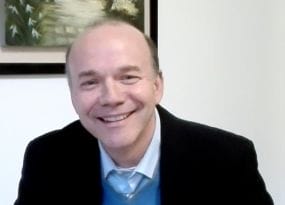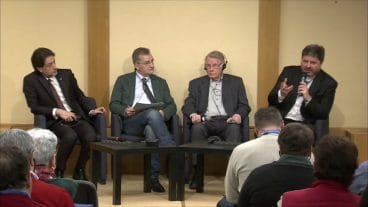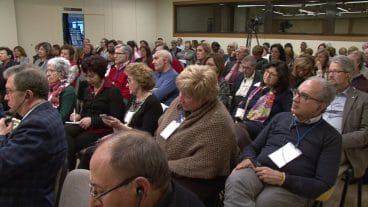
Marc St Hilaire. Focolare Movement
“The institutional dimension and the charismatic dimension of which the Focolare Movement is a very significant expression, are co-essential to the very constitution of the Church founded by Jesus, because they work together to make present the mystery of Christ and his saving action in the world.” Twenty years ago, on Pentecost 1998, speaking before 250,000 members of 50 ecclesial Movements and new communities who had gone to Rome for the World Congress of Ecclesial Movements, Pope John Paul II clarified for the first time the place in the Church of the numerous new phenomena that had emerged from the charisms in the Church. Since then, thousands of initiatives around the world have been nurturing the process of communion among movements. In the meeting at Castel Gandolfo (April 5-8), members of different ecclesial organizations gave presentations that highlighted the fruits of that ongoing process, giving a new impetus to their efforts in favour of unity. “The word
co-essential refers to the nature [of the Church],” Marc St Hilaire stressed. He is a counsellor for the Focolare, along with Margaret Karram, working for communion within the Catholic Church. “It means that there is no Church without its institution, and no Church without its charisms.”

Salvatore Martinez, Aurelio Molè, P. Marmann, D. Angelo Romano
“It’s the Holy Spirit who asks this of us,”
Salvatore Martinez insisted, president of the
Renewal in the Spirit in Italy, according to which “Communion is a grand challenge among the charisms within the Church.” It’s a spiritual friendship, “born of the Spirit, and it’s a marvellous gift.” “Chiara Lubich (founder of the Focolare) gave some advice on building communion,” Margaret Karram recounts. “Before all else, build personal relationships, not with movements, but with the people in the movements. Then, pray for one another, offer homes and facilities for meetings and activities, and give make space for one another in your publications.” To develop a dialogue that is fruitful, said
Fr Micahel J Marmann, who is the current general president of the
Schoenstatt Movement, “Technique is of no use. This type of dialogue has to be inspired from within, that is, by love” in the awareness that diversity is an enrichment and communion and co-responsibility a must. It’s from here that initiatives are begun around the world. Beginning from a small group, in 2015, “Together for Mexico” involved five thousand from 60 movements desirous to do something for their country. “Now we’re working on the 2019 event with 80 movements,” Margaret Karram reports. “Whereas, in other countries they hold projects in favour of the environment or for disarmament, in the Middle East they pray for peace; in Italy they hold concerts to raise money for the victims of war and the poor.
 Fr Angelo Romano, Rector of the Basilica of St Bartholomew in Rome, for the Community of Sant’Egidio
Fr Angelo Romano, Rector of the Basilica of St Bartholomew in Rome, for the Community of Sant’Egidio and in charge of dialogue, “There are sectors in which the path of communion has to grow: as Christians we cannot refuse to question ourselves about the phenomenon of migration and take steps together. Another topic to examine more deeply are the conflicts, which generate poverty and suffering and send a message that is contrary to the Gospel, which says that those who are different can never live together; whereas, we believe that the Gospel is a leaven of unity and peace, and Christians are called to provide a new perspective.” The work of the movements is an incarnation of the Gospel: “We’re the answer,” says Martinez, “of that dichotomy that many would like to put between doctrine and mercy, because the theology of the spirit is done with the life.” And proposing a Church that is poor and missionary is not in antithesis with the doctrine, but part of it: “It’s that dialogue with the world and modernity that the Second Vatican Council prophesied,” says Martinez, “which Paul VI was the first to attempt and all the popes to continue. It’s this original synthesis that the Pope asks us to give witness to: a doctrine that one incarnates in the history.” In this prospective, twenty years from 1998,
the ecclesial movements appear more and more to be “the Providential answer to the needs of our time”. It is an answer that implies a constant effort towards unity, to bringing the face of Christ to the human peripheries.


 Fr Angelo Romano, Rector of the Basilica of St Bartholomew in Rome, for the Community of Sant’Egidio and in charge of dialogue, “There are sectors in which the path of communion has to grow: as Christians we cannot refuse to question ourselves about the phenomenon of migration and take steps together. Another topic to examine more deeply are the conflicts, which generate poverty and suffering and send a message that is contrary to the Gospel, which says that those who are different can never live together; whereas, we believe that the Gospel is a leaven of unity and peace, and Christians are called to provide a new perspective.” The work of the movements is an incarnation of the Gospel: “We’re the answer,” says Martinez, “of that dichotomy that many would like to put between doctrine and mercy, because the theology of the spirit is done with the life.” And proposing a Church that is poor and missionary is not in antithesis with the doctrine, but part of it: “It’s that dialogue with the world and modernity that the Second Vatican Council prophesied,” says Martinez, “which Paul VI was the first to attempt and all the popes to continue. It’s this original synthesis that the Pope asks us to give witness to: a doctrine that one incarnates in the history.” In this prospective, twenty years from 1998, the ecclesial movements appear more and more to be “the Providential answer to the needs of our time”. It is an answer that implies a constant effort towards unity, to bringing the face of Christ to the human peripheries.
Fr Angelo Romano, Rector of the Basilica of St Bartholomew in Rome, for the Community of Sant’Egidio and in charge of dialogue, “There are sectors in which the path of communion has to grow: as Christians we cannot refuse to question ourselves about the phenomenon of migration and take steps together. Another topic to examine more deeply are the conflicts, which generate poverty and suffering and send a message that is contrary to the Gospel, which says that those who are different can never live together; whereas, we believe that the Gospel is a leaven of unity and peace, and Christians are called to provide a new perspective.” The work of the movements is an incarnation of the Gospel: “We’re the answer,” says Martinez, “of that dichotomy that many would like to put between doctrine and mercy, because the theology of the spirit is done with the life.” And proposing a Church that is poor and missionary is not in antithesis with the doctrine, but part of it: “It’s that dialogue with the world and modernity that the Second Vatican Council prophesied,” says Martinez, “which Paul VI was the first to attempt and all the popes to continue. It’s this original synthesis that the Pope asks us to give witness to: a doctrine that one incarnates in the history.” In this prospective, twenty years from 1998, the ecclesial movements appear more and more to be “the Providential answer to the needs of our time”. It is an answer that implies a constant effort towards unity, to bringing the face of Christ to the human peripheries.




0 Comments